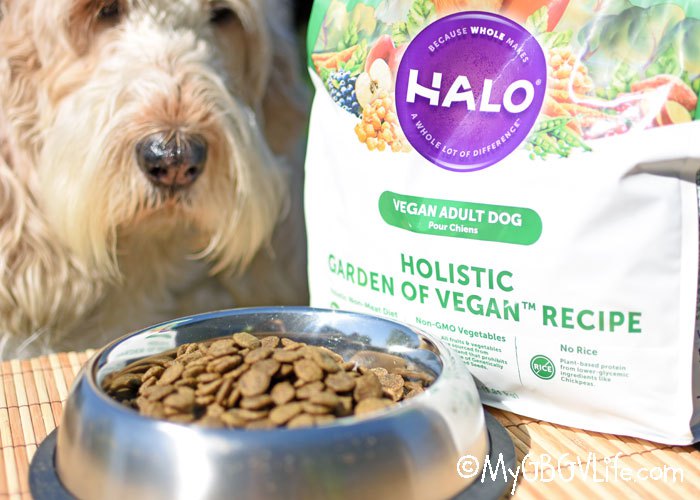
There are a number of vegan and vegetarian dog foods out there on the market, and sometimes it can be hard to tell who’s who in the zoo! Some specifically point out meat-free recipes with titles including “vegetarian” or “vegan,” while others avoid doing so. Let’s take a quick look at the differences between them.
What is vegetarian food?
In the context of food, the term vegetarian indicates that the product contains no ingredients produced directly from animal flesh or organs. However, the term is relatively loosely applied, and there may still be animal-derived ingredients used. When reading the ingredient list, it is easy to determine if animal products such as eggs are included in the diet. Some other ingredients, however, are less easy to identify as originating from animals, and may be included in vegetarian products:
| Ingredient: | Derived from: |
| Albumen | Eggs, milk, blood, muscle |
| Casein/caseinate | Milk |
| Choline bitartrate | Eggs, blood, milk (plant and synthetic forms also exist) |
| DHA and EPA | Fish oil (unless specified from algae) |
| Gelatin | Mammalian cartilage, tendons, ligaments and connective tissues |
| Methionine | Egg, milk (synthetic forms also exist) |
| Vitamin A | Fish liver, pig liver, egg (synthetic forms also exist) |
| Vitamin D3 (Cholecalciferol) | Sheep skin |
| Whey | Mammalian milk |
What is vegan food?
Unlike the term “vegetarian,” which was defined by the Vegetarian Society as relating to a diet, the term “vegan” was defined by the Vegan Society as a way of living. Thus, in the context of dog food, plant-based (meaning a product containing no ingredients derived from animals at all) is a more appropriate term. Plant-based products use only non-animal, plant-derived, or synthetic ingredients to provide all the nutrients required. Sometimes, a plant-based product will be labelled as vegetarian, but a quick check over the packaging will typically reveal the word “vegan” and often a statement that the product contains no animal ingredients.
Are there advantages of one diet over the other?
Benefits of vegetarian or vegan diets depend on the reasons for choosing a meat-free diet. Some dogs with dietary allergies and sensitivities are fed meat-free diets, as dietary allergies are most common to protein in the food. A vegetarian diet may not be ideal for these dogs, as they may still react to animal proteins within the diet, with dairy and egg being two of the most common canine allergens. Other dogs are fed meat-free diets in accordance with their parents’ life philosophy. Considering that vegetarian diets still contain ingredients derived from animals, these are unlikely to be considered appropriate by those pet parents.
Where dog health is concerned, there are no recognized benefits of vegetarian diets over vegan or plant-based ones. Commercial dog foods formulated in accordance with the Association of American Feed Control Officials (AAFCO) contain all the essential nutrients in the amounts recommended according to the industry’s current guidelines. There are no recognized benefits of particular ingredients, per se, provided the nutrient profile is met, and plant-based dog foods meet those nutrient profiles by using non-animal, plant-derived, and synthetic ingredients.
What are synthetic ingredients in pet food, and are they healthy?
Though the term “synthetic” makes an ingredient sound like it was cooked up in a laboratory by a mad scientist, really what the term often refers to is biological synthesis of the nutrient by strains of bacteria or yeasts in culture. Synthetic ingredients are indeed safe and healthy and are used widely throughout the pet food industry, not just in plant-based dog food. For example, taurine, a ?-aminosulfonic acid, is very heat labile and most is lost during pet food processing. For cat diets, and many dog diets, synthetic taurine is then added to the diet to account for processing losses.
How do I choose a plant-based diet for my dog?
If you are perusing the aisles at your local pet store, the first thing to do is to check on a product’s packaging to find a statement of nutritional adequacy in accordance with AAFCO. This is the most important step for ensuring that the diet is formulated to be complete and balanced for your dog’s life-stage – that is, puppy growth or adult maintenance. On the other hand, if you are doing a bit of reading around which diet you want to choose, the World Small Animal Veterinary Association has a very handy guideline on how to select the best food for your pet. This provides a number of questions that can be asked of a pet food company to determine your confidence in their product.
For more information about plant-based dog food, have a look at Halo’s vegan pet food page: or checkout Halo’s vegan FAQs and see the section on “Vegan for Dogs.”
Take care, and enjoy your next meat-free meal!
 Dr. Sarah Dodd is a veterinarian with a special focus on companion animal nutrition. Her studies have taken her around the world living in England, Scotland, New Zealand, Australia, the United States of America and Canada – where she currently reside with her three happy rescue dogs Peppa, Dottie and Timmy.
Dr. Sarah Dodd is a veterinarian with a special focus on companion animal nutrition. Her studies have taken her around the world living in England, Scotland, New Zealand, Australia, the United States of America and Canada – where she currently reside with her three happy rescue dogs Peppa, Dottie and Timmy.
She graduated from veterinary school in 2016, since then she has pursued her passion in nutrition with a clinical nutrition internship and a Master’s degree at the Ontario Veterinary College. She is currently completing her nutrition residency with the European College of Veterinary and Comparative Nutrition and enrolled in a PhD studying plant-based diets for pets.

